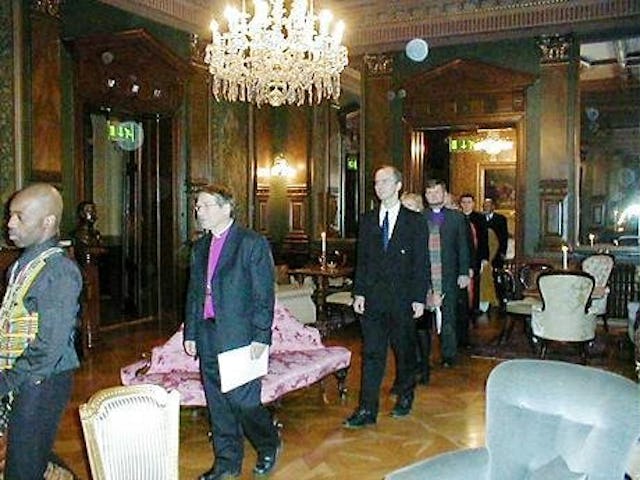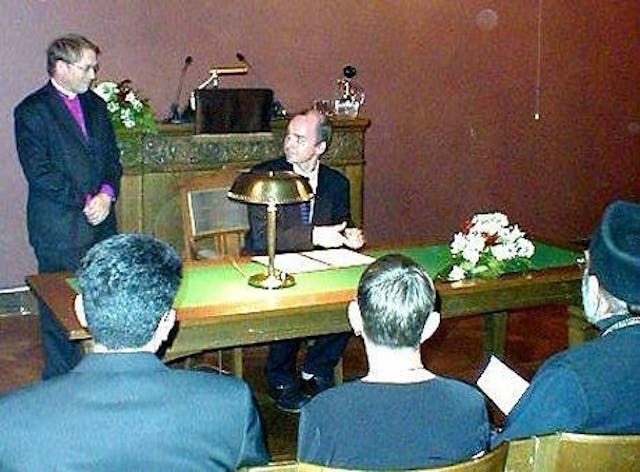In Norway, interfaith coalition commits to principles of religious freedom
OSLO, Norway — In a document signing ceremony on 8 November 2001, an interfaith coalition composed of the major religious groups here, including the Norwegian Baha'i community, made a commitment to the principles of religious tolerance embodied in the Oslo Declaration on Freedom of Religion or Belief.
The action was significant because of the diversity of religious groups that participated and committed themselves to upholding religious tolerance in Norway, said Britt Strandlie Thoresen, secretary of the National Spiritual Assembly of the Baha'is of Norway.
"There were 25 groups that signed the Declaration, and they included religious organizations from a very wide range of perspectives," said Ms. Thoresen, who was also head of the event's organizing committee. "There were representatives of Buddhism, Hinduism, Islam, Judaism, Sikhism, humanism and other groups, as well as various denominations within Christianity.
"This was really a very historic event because we've never had such a diversity of groups come together like this before," said Ms. Thoresen.
The Oslo Declaration on Freedom of Religion or Belief was drafted and adopted by a coalition of governments and non- governmental organizations here in August 1998 at an international conference on religious freedom. Among the participants in that conference was the Baha'i International Community.
Designed to give support to United Nations efforts to promote religious tolerance, the Declaration specifically affirms that "every human being has a responsibility to condemn discrimination and intolerance based on religions and belief, and to apply religion or belief in support of human dignity and peace" and gives recognition to the idea that "religions and beliefs teach peace and good will."
"The Oslo Declaration creates the obligation to work together for religious freedom, tolerance and mutual respect," said Hilde Frafjord Johnsen, Norwegian Minister of International Development, in a speech at the ceremony. "It represents an important step, also internationally, in the direction of actualizing the United Nations' instruments in this area."
"Just now, in these days we fully see the importance of work for tolerance, equality and respect across old lines of division and conflicts," Ms. Johnsen continued. "Tuesday, the 11th of September, the day that has been burned into our consciousness, has become a turning point. Our task will be to ensure that it becomes a turning point under the sign of reconciliation, and not allow the forces of negativity -- even if they are ever so strong -- to decide which direction our lives and our global community shall take."
The signing ceremony was initiated by the Cooperation Council of Religions and Life-Stance Communities and the Oslo Coalition of Freedom of Religion or Belief. The Baha'i community of Norway has been a member of both groups. The ceremony took place at the Norwegian Academy of Science and Letters and was observed by more than 100 guests, including officials of the Norwegian government, members of parliament, representatives from some 16 foreign embassies, and representatives of various human rights groups and academic organizations.
In a speech at the signing ceremony, Anne Sender, a representative of the Jewish Community of Norway, noted that the country's official policies on religion had long been dominated by its acceptance of Christianity as the state religion, but added that today it could not longer isolate itself from international trends.
"Today, the greatest challenge for religious and ethical communities is precisely the meeting with modernity, with individual freedom, and the great population movements," said Ms. Sender, who was also coordinator of the 1998 Oslo Conference. "In these three main areas, there are subjects so volatile that if they really do explode, it would be a matter of our existence or nonexistence as a society of values." We have to place ourselves in a global picture that is based on reality."
Members of the Baha'i community of Norway contributed to the success of the event in a number of ways. Baha'i pianist Trond Schau played as people arrived for the ceremony and Maiken Schau, also a Baha'i, played a flute solo during the signing ceremony itself.
After the ceremony, Mr. Gunnar Stalsett, the Bishop of Oslo and president of the Oslo Coalition of Freedom of Religion or Belief, thanked the participants, stating that he would give a copy of the signed protocol to the Secretary General of the United Nations, Mr. Kofi Annan, when he comes to Oslo on 10 December to receive the Nobel Peace Prize on behalf of the United Nations.

